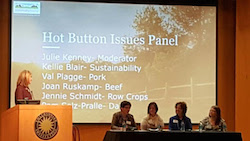 CommonGround volunteer farm women from across the country met in Washington D.C. at the National Museum of American History to learn how to share their story. Presentations from various ag groups, like the Center for Food Integrity, helped give the women tools to reach urban and suburban moms online, through public speaking, and in media interviews. Attendees talked about prevalent consumer ideas and how to build trust to reach their audience.
CommonGround volunteer farm women from across the country met in Washington D.C. at the National Museum of American History to learn how to share their story. Presentations from various ag groups, like the Center for Food Integrity, helped give the women tools to reach urban and suburban moms online, through public speaking, and in media interviews. Attendees talked about prevalent consumer ideas and how to build trust to reach their audience.
“I came away from the conference with an appreciation for the idea that we need to embrace skepticism in conversations about food and farming with those outside of agriculture,” said National Corn Growers Association Grower Services Action Team Chair, Patty Mann. “Just listening to concerns and sharing values can assure others that we really do want the same things for our families.
“Many mistrust farming because they lack access to farmers and ranchers. They sense the food system has changed, but they do not understand why. The more we can find in common, the more likely consumers will be open to hearing our stories. We need to be open about what we do and own our story instead of letting someone else tell it for us.”
The conference offered both the volunteers and staff a chance to share insight into their CommonGround experiences over the past year, during which the involved states hosted more than 120 state events and grew to include more than 170 volunteers, CommonGround continued to grow its grassroots network. Since it began more than five years ago, CommonGround has sparked more than 680 million conversations with consumers.
At the event CommonGround shared its latest project, a video designed to reassure consumers about pesticide use on crops. The video, titled “Not a Latte,” received more than 94,000 views on Facebook in the first 36 hours of its release.
CommonGround was created by the National Corn Growers Association, the United Soybean Board and their state affiliates. The group of farm women volunteers focus on nine areas of interest: farm ownership; GMOs; food safety; antibiotics and animal health; hormones in meat and milk; organic and local foods; food prices; and sustainability, to encourage others to enjoy their food without fear.
